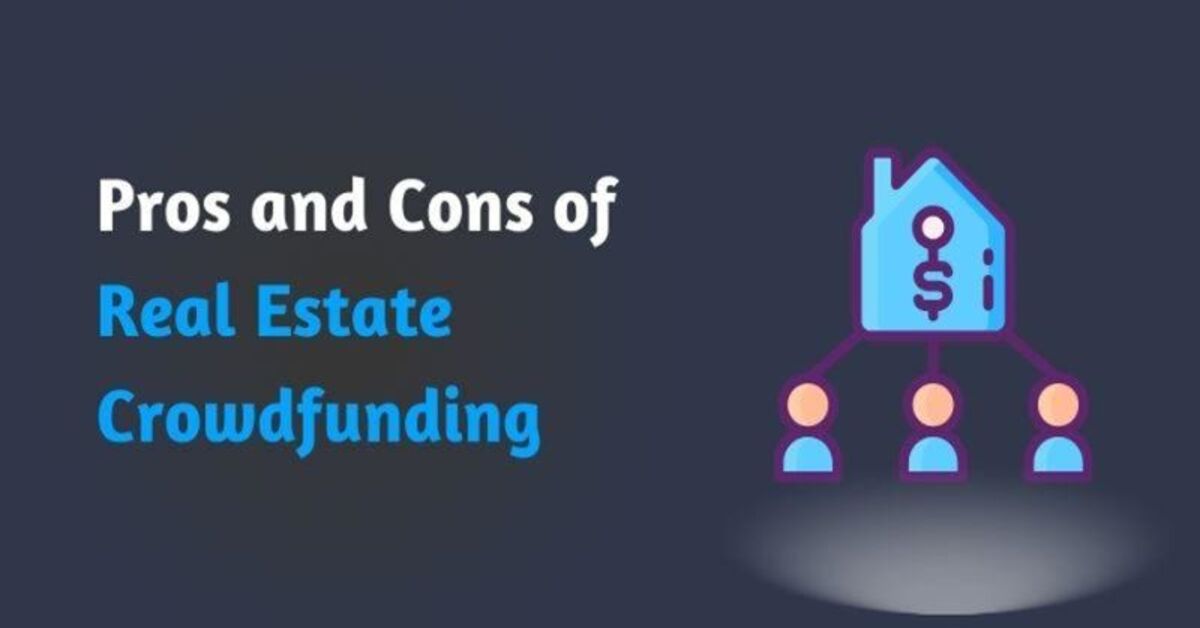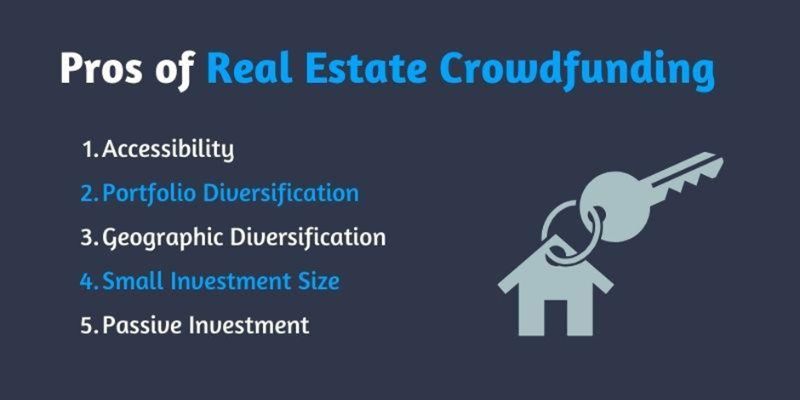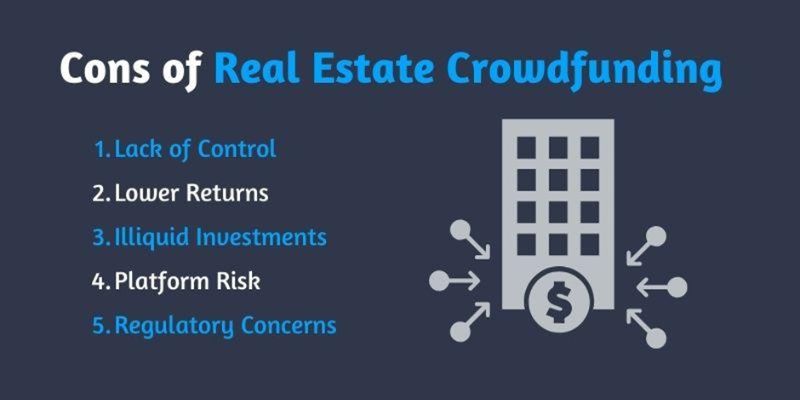Explore the digital age of investment, where real estate crowdfunding is our prime focus. Want to know why? Let’s understand the value of real estate crowdfunding with an example first.
Picture this: multiple investors pooling resources to fund a real estate project. This collective strategy defines real estate crowdfunding, offering a unique opportunity for both new and seasoned investors.
In this article, we’ll explore the pros and cons of real estate crowdfunding.
Real estate crowdfunding brings inclusivity into investing, helping individuals to participate in projects that were once out of reach. The cumulative effort of everyone involved contributes to funding projects with promising returns.
In this blog, we’ll understand the complexities associated with real estate crowdfunding, examining its merits and drawbacks.
Whether you’re looking into this avenue for profit or want to prepare for its challenges, this blog can help you remain informed and make intelligent investment decisions.
Pros of Real Estate Crowdfunding
Before deciding to opt for the option of real estate crowdfunding, it is essential to understand the benefits associated with it.
From enhanced accessibility to the benefits of portfolio diversification, explore how this innovative investment opportunity is reshaping the real estate landscape.
1. Accessibility in Real Estate Crowdfunding
Real estate investment has become more accessible through crowdfunding, breaking traditional barriers. Formerly, private real estate investments were exclusive to high-net-worth individuals with substantial capital and connections.
However, with changes in laws and the rise of online crowdfunding platforms, these barriers have collapsed, making real estate investment more attainable.
Reduced Capital Requirement
Crowdfunding significantly lowers the entry point in terms of capital. Crowdfunding allows multiple investors to pool resources, unlike traditional real estate investments that demand substantial sums.
Some platforms accept contributions as low as a few hundred dollars, enabling a more diverse demographic to invest in real estate.
No Need for Mortgage Loans
Traditional real estate often involves significant debt, such as a mortgage. Crowdfunding eliminates the need for direct engagement with lenders, allowing for direct equity participation without the complexities of managing loans.
Wide Range of Choices
Crowdfunding platforms present a list of properties spanning different regions and types. Investors can find opportunities tailored to their preferences, whether interested in residential properties, commercial establishments, or vacation rentals.
Entry for Novices
Real estate is complex, especially for novices. Crowdfunding platforms provide comprehensive information about each investment, simplifying complex jargon. This makes the real estate sector more approachable for beginners.
Digital Convenience
In the digital age, accessing investment opportunities is pretty simple. Crowdfunding platforms enable potential investors to explore, analyze, and commit to opportunities from the comfort of their homes, eliminating the need for physical visits and extensive paperwork.
2. Diversification in Real Estate Crowdfunding
Real estate crowdfunding offers a unique hub for diversification in property investments, minimizing risks associated with a singular investment. Here’s how:
Geographic Spread
Crowdfunding enables portfolio diversification across different locations, mitigating risks associated with localized economic downturns, natural disasters, or region-specific challenges.
Varied Property Types
Crowdfunding platforms offer a range of property types, from residential and commercial to industrial and mixed-use properties. Investors can have a stake in various projects simultaneously, balancing overall portfolio risk.
Multiple Project Exposure
Investors can distribute funds across multiple projects instead of locking significant capital in a single property. This reduces the risk associated with any single project’s failure or underperformance.
Different Development Stages
Investors can choose from projects at various development phases, from raw land to under-construction projects to fully developed units, ensuring a more balanced risk profile.
Asset Class Mix
Some crowdfunding platforms offer investments in Real Estate Investment Trusts (REITs) or property-backed securities, providing another layer of diversification.
Tenant Diversification
Commercial real estate crowdfunding, especially in multi-tenant properties, spreads the risk across multiple tenants, ensuring a more stable income stream.
3. Passive Income in Real Estate Crowdfunding
Investing in real estate through crowdfunding offers passive income, freeing investors from active property management responsibilities. Here’s a closer look at passive income through real estate crowdfunding:
Hands-off Investment
Crowdfunding eliminates the need for active involvement in property management. Most responsibilities are shouldered by the platform or the project’s management team, allowing investors to earn without involvement in day-to-day property affairs.
Regular Income Streams
Investors receive a portion of the rental income in proportion to their investment, often distributed monthly or quarterly, providing a steady income stream.
Appreciation Benefits
Apart from rental yield, investors may benefit from property appreciation. Investors receive their share of the gains if a property increases in value over time and is sold at a profit.
Diversified Earning Potential
Investors can tap into multiple income streams by diversifying investments across various properties and regions, ensuring a more balanced and consistent passive income flow.
Automation and Digitization
Crowdfunding platforms leverage technology for smooth investment processes, offering automated distributions, digital dashboards, and timely notifications for effortless tracking.
Reduced Financial Burden
Crowdfunded, equity-based projects are usually free from monthly financial obligations associated with loans, providing a more hassle-free investment experience.
4. Expert Management in Real Estate Crowdfunding
The complexity of the real estate sector requires expert management for successful crowdfunding investments. Let’s explore the implications and benefits of such expertise:
Professional Property Selection
Expert management teams conduct thorough due diligence, market analyses, and feasibility studies before presenting any property as an investment opportunity, ensuring optimal property selection.
Efficient Property Management
Crowdfunding platforms partner with professional property management companies to ensure effective property management, tenant handling, maintenance, legalities, and other logistical aspects.
Legal and Regulatory Compliance
Expert management ensures that all investments comply with local laws, reducing the risk of legal complications that could jeopardize the investment.
Financial Awareness
Expert management teams include financial professionals who optimize investments, manage debts, and maximize returns by understanding the financial complexities of the real estate market.
Strategic Decision Making
Expert management teams navigate market shifts, adapting to downturns or capitalizing on new opportunities, safeguarding the investor’s interests and the property’s value.
Transparent Reporting
Reliable platforms provide regular updates, comprehensive reports, and analyses to investors, building trust and empowering investors with knowledge about their investment performance.
Risk Mitigation
Expert management can foresee potential challenges and implement strategies to mitigate them, reducing the inherent risks of real estate investments.
Navigating Market Cycles
Expert management teams guide investments through market cycles, making decisions that maximize returns by understanding the dynamic nature of real estate markets.
5. Transparency in Real Estate Crowdfunding
Transparency is a foundation of real estate crowdfunding, emphasizing open access to details, regular performance reports, due diligence, clarity on fees, open communication channels, transparent governance, technology-driven insights, and clear exit strategies.
Open Access to Investment Details
Crowdfunding platforms provide comprehensive details about each investment opportunity, ensuring investors make informed decisions.
Regular Performance Reports
Transparent platforms update investors regularly about the property’s performance, maintaining transparency post-investment.
Due Diligence and Audits
Real estate crowdfunding platforms conduct rigorous due diligence, investigating property titles, legal compliance, and financial feasibility, and share the results with potential investors.
Clarity on fees
Leading crowdfunding platforms clearly outline fee structures, ensuring investors know the costs involved and avoiding hidden fees or ambiguous charges.
Open Communication Channels
Platforms offer direct communication channels for queries, clarifications, and feedback, solidifying transparency through two-way communication.
Transparent Governance
Platforms have transparent governance structures detailing decision-making protocols, conflict resolution mechanisms, and stakeholder engagement guidelines.
Technology-Driven Insights
Platforms leverage technology to provide real-time insights, performance analytics, and projections, making transparency an actionable aspect of the investment journey.
Clear Exit Strategies
Transparent platforms outline clear exit strategies, detailing scenarios for property sales, profit distribution, and timelines for liquidating investments.
Cons of Real Estate Crowdfunding
While offering diverse investment opportunities, real estate crowdfunding has cons such as limited liquidity, reliance on platform decisions, and potential regulatory uncertainties, requiring investors to carefully weigh the risks against the benefits.
Let’s explore these cons in detail so you can understand their implications and make an intelligent decision in the real estate arena.
1. Illiquid Investments
While offering benefits such as diversification and passive income, real estate crowdfunding raises valid concerns about liquidity. Here are the main concerns related to illiquid investments:
Longer Investment Horizons
Real estate investments inherently have more extended holding periods. With predetermined exit strategies, crowdfunding may require investors to commit for years. This contrasts sharply with the liquidity of stocks or bonds.
Market Dynamics
Market conditions deeply influence the liquidity of real estate holdings. Property sales can be protracted in a slow market, intensifying investor liquidity concerns.
Platform’s Exit Strategy
Unlike individual ownership, crowdfunding decisions often rest on the platform or majority vote. This lack of control means individual investors must wait for collective decisions on liquidating assets.
Secondary Market Limitations
Though some platforms offer secondary markets, they are growing, potentially illiquid, and may need to fetch desired values. The absence of such resale options on all platforms compounds liquidity challenges.
Predetermined Payout Schedules
Crowdfunded projects often tie significant returns to property appreciation upon sale, which might occur years later. This contrasts with immediate gains seen in more liquid investments.
Platform Stability
Liquidity is indirectly linked to the platform’s stability. A platform’s operational, financial, or regulatory challenges could disrupt investors’ access to or liquidation of their funds.
Contractual Restrictions
Some agreements may restrict immediate liquidation or impose penalties for early withdrawal, adding another layer of complexity to liquidity concerns.
Diversification vs. Liquidity Trade-off
While diversification is a barrier against risk, it also means capital spreads thin. Liquidating small stakes across multiple properties might prove more challenging than a significant stake in a single property.
2. Platform Risk in Real Estate Crowdfunding
The expansion of crowdfunding platforms introduces a spectrum of risks that investors must navigate. A detailed exploration of these platform-related risks provides insight:
Platform Longevity
The emerging nature of crowdfunding platforms raises concerns about insolvency or shutdown. Ceasing operations could create complications for investors in terms of accessing investments or receiving payouts.
Regulatory Compliance
Platforms must adhere to complex regulations while operating at the intersection of real estate, finance, and technology. Non-compliance can lead to legal repercussions impacting hosted investments.
Operational Competence
Efficient operations, from assessing opportunities to stakeholder communications, are crucial. Inefficiencies or errors can jeopardize returns and investor trust.
Security Concerns
Digital platforms are vulnerable to cyber threats. Breaches could result in the theft of sensitive user information, including personal and financial details.
Transparency Issues
Transparency is key. Platforms that lack openness may hide inefficiencies, risks, or potential malpractices, undermining investor confidence.
Due Diligence Failures
Platforms must conduct thorough due diligence on listed properties. Oversight or negligence in this process exposes investors to undue risks.
Fee Structures
If transparently communicated, fee structure variations can erode returns, leaving investors satisfied with outcomes.
Conflicts of Interest
Misalignment between platform and investor interests may occur, with platforms prioritizing listings that offer higher commissions, potentially at the expense of the best investment options.
Technology Glitches
Platform functionality relies on technology. Glitches, downtimes, or software errors can disrupt processes, affecting investments, distributions, or communications.
Limited Track Record
New platforms needing an established track record pose higher risks. The absence of successful deals or an unproven management team increases investment uncertainty.
3. Lower Returns in Real Estate Crowdfunding
Real estate crowdfunding, though promising, introduces uncertainties. A thorough exploration of return uncertainties reveals the multifaceted nature of this investment avenue:
Market Volatility
Real estate markets, susceptible to fluctuations, can be influenced by economic downturns, interest rate changes, or global events, impacting property values and expected returns.
Project Specific Risks
Each project has unique risks, from construction delays to unforeseen maintenance issues, affecting overall profitability.
Overly Optimistic Projections
Platforms might project optimistic returns, potentially overlooking challenges or market downturns, leading to disparities between expected and actual returns.
Platform Due Diligence
Adequate due diligence by the platform is essential. Incomplete screening can result in higher risks, influencing returns.
Diversification Trade-offs
Diversifying reduces risk but balances high returns from one property with potential underperformance from another.
Exit Strategy Complications
Execution challenges in exit strategies linked to property sale or refinancing can delay or diminish returns.
Competitive Landscape
Increased competition can raise property prices, making profitable deals harder to secure and potentially reducing overall returns.
External Economic Factors
Broader economic factors impact returns, from rising interest rates to economic recessions affecting rental incomes and property demand.
Tenant-related Risks
Rental property returns depend on stable rental incomes. Vacancies, rent defaults, or increased management costs can erode expected returns.
Tax Implications
Changes in property taxes, capital gains tax, or other financial regulations can influence net returns, adding another layer of uncertainty.
4. Grappling with Lack of Control in Real Estate Crowdfunding
Real estate crowdfunding offers opportunities but comes with limited individual control. Here is a clear description of this limitation to provide clarity for potential investors:
Decision-Making Process
Traditional ownership affords decision-making control. Crowdfunding, managed by platforms or sponsors, sidelines investors in daily management and strategic choices.
Reliance on Platform or Sponsor Expertise
Investors depend on platform or sponsor expertise. Trusting their ability to select profitable projects and make beneficial decisions becomes paramount.
Exit Strategy
Exiting relies on predefined strategies or collective decisions. Individual investors may need help to exit before the agreed term.
Customization and Personal Touch
Crowdfunded properties need more room for personalization. Collective management limits the accommodation of individual preferences.
Information Flow and Transparency
Despite platform transparency, controlled information flow can hinder a comprehensive understanding of property performance for investors.
Dilution of Stake
With pooled resources, individual stakes are small. A diluted stake reduces influence on the project, emphasizing limited control.
5. Unpacking Fees in Real Estate Crowdfunding
Understanding fee structures is integral to real estate crowdfunding. Platforms, serving as intermediaries, collect costs, which are recovered through various fees. A thorough examination sheds light on this aspect:
Platform Fees
Charged for accessing and investing, these cover operational costs and profit margins. They can be fixed or a percentage of the invested amount.
Management Fees
Applied to actively managed projects, these cover overseeing the property, tenant issues, and day-to-day operations.
Origination Fees
Charged at investment start, these cover costs for originating and setting up the investment opportunity.
Performance or Profit-Sharing Fees
A percentage of profits earned, aligning platform interests with investors for shared success.
Exit Fees
Charged when liquidating an investment, covering costs associated with selling and distribution.
Secondary Market Fees
Applied for transactions in secondary markets, providing liquidity before official exits.
Late Payment or Default Fees
In debt-based crowdfunding, fees associated with late payments or defaults compensate for added risk.
Advisory or Consultation Fees
Specialized services come with fees, covering portfolio guidance or market analyses.
Hidden Fees
Potential undisclosed fees, if not transparent, destroy investor trust.
Fee Cumulative Impact
Cumulative effects, even if individually small, significantly impact overall profitability, warranting investor awareness.
6. Regulatory Concerns in Real Estate Crowdfunding
Regulatory considerations shape real estate crowdfunding. The evolving nature of this sector prompts scrutiny for investor protection and legal compliance:
Evolving Landscape
Rapid evolution requires regulatory adaptation, creating potential uncertainties for platforms and investors.
Investor Protection
Regulators aim to safeguard retail investors from fraud or misrepresentation, emphasizing due diligence and transparency.
Accredited vs. Non-Accredited Investors
Distinctions based on investor classification impact accessibility and compliance, particularly in regions with SEC-like regulations.
Cross-border Investments
Global platforms must adhere to the investor’s home country and property location regulations, introducing complexity.
Disclosure Requirements
Strict disclosure mandates ensure investors receive comprehensive information about risks, returns, and potential conflicts.
Fundraising Limits
Regulatory caps on fundraising mitigate risks, influencing project scale and investor opportunities.
Secondary Market Regulations
Ensuring fair and transparent secondary markets is crucial for maintaining investor confidence.
Platform Licensing
Whether financial or real estate-related, compliance with licensing requirements ensures adherence to industry standards.
Tax Implications
Regulations cover the tax on earnings, necessitating investor awareness of implications on net returns.
Data Protection and Privacy
Digital platforms must comply with data protection regulations, securing sensitive user information from potential breaches.
Conclusion
Understanding real estate crowdfunding becomes necessary when making financial decisions and reaping the rewards of investing in real estate.
The pros of real estate crowdfunding include better accessibility, a diversified portfolio, passive income opportunity, geographical diversification, and manageable investment size.
The cons of real estate crowdfunding include regulatory concerns, lower return on investments, lack of control over opportunities, and platform-associated risks.
Considering these pros and cons of real estate crowdfunding is essential to make your decision, and it can help you better understand the ins and outs of concepts and workings of real estate crowdfunding.
To understand all the UAE’s real estate aspects, seek professional guidance from ThinkProp’s real estate training programs.
Whether you are a seasoned real estate professional or a novice, these courses can help you understand the steps involved in the sales process; mortgage broker courses and broker licensing courses align with getting familiar with sales psychology.







